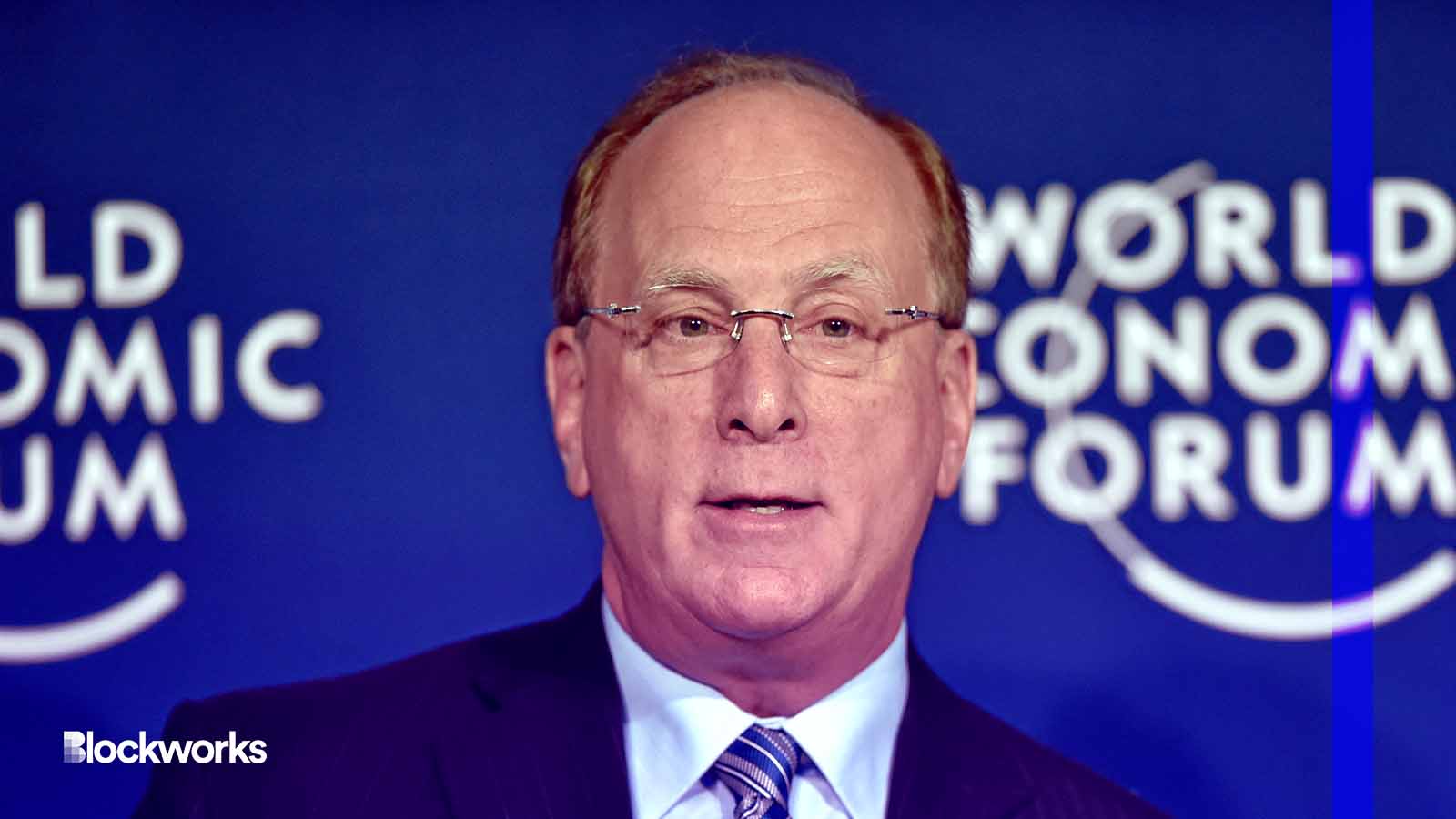Blockchain ETF Issuers With ‘Crypto Street Cred’ May Come Out on Top
BlackRock, Fidelity launched blockchain ETFs a year ago — how’s that going?

BlackRock CEO Larry Fink | World Economic Forum (CC license)
Blockchain technology continues to present an exciting promise, one capable of boosting efficiency and transparency, financial leaders have said.
Yet blockchain-focused ETFs issued by some of the world’s largest and most influential fund groups have very few assets to show for it.
Investors not high on BlackRock’s offering
The phrase “blockchain, not bitcoin” has been a rallying cry of sorts for traditional financiers and crypto-natives alike — a sentiment that crypto’s underlying technology is more valuable than volatile tokens alone.
Tokenization has been a crypto practice that Wall Street types accustomed to asset-backed securities plays have often championed as a regulated US asset class.
BlackRock CEO Larry Fink went as far as to say that tokenizing securities is “the next generation for markets” during a New York Times summit in November.
The company, which has roughly $9 trillion in assets under management, launched its iShares and Blockchain Tech ETF (IBLC) in April 2022. BlackRock added the fund to its “megatrends” product suite at the time.
But after more than a year on the market, IBLC’s assets under management sit at a scant $7 million. The fund — with top holdings including Riot Platforms, Coinbase and Block — is down about 8% from a month ago, but was up 68% year to date through midday Tuesday.
Only 21 of BlackRock’s 400 or so ETFs (including those under its iShares subsidiary) have less assets than IBLC, according to ETF.com data.
A BlackRock spokesperson declined to comment.
Assets in thematic funds more generally — products focusing on specific trends in terms of their foldings — have more than doubled since just before the pandemic, Morningstar data shows.
Through April, though, the sector’s assets had plummeted, dropping about 40% since markets peaked in mid-2021.
 Source: Morningstar
Source: Morningstar
Even Ark Invest’s Innovation ETF (ARKK) — a popular offering recently controlling up to $7.8 billion in assets — has booked outflows.
That’s despite year to date gains of more than 26%, according to Neena Mishra, director of ETF research for Zacks Investment Research.
“Market uncertainties this year have driven investors into safer areas of the market, and investors’ appetite for risk assets remains low,” she told Blockworks.
Nathan Geraci, president of The ETF Store, said some investors were badly burned during last year’s rout and likely don’t want to get scorched again — particularly as the SEC has cracked down on crypto.
“I think another subset of investors is simply allocating to bitcoin futures ETFs,” Geraci said. “Ultimately, it’s my belief that many investors are still waiting for the real deal: a spot bitcoin ETF.”
Read more: SEC Responds to Coinbase Request For Action: ‘No’
Little traction for Invesco, Fidelity
BlackRock is not the only fund giant struggling to gather assets for its crypto-adjacent fund.
Fidelity brought to market its Crypto Industry and Digital Payments ETF (FDIG) days before the launch of IBLC. After 15 months on the market, it has $30 million in assets. FDIG is up 53% so far in 2023.
“Where our customers invest matters more than ever, and Fidelity’s goal is to provide our customers with choice — a diverse range of products and services that meet their distinct investing goals,” a Fidelity spokesperson told Blockworks in a statement. “As with anything we bring to market, we take a long-term view.”
Before BlackRock and Fidelity launched blockchain-related offerings, Invesco introduced its Crypto Economy ETF (SATO), as well as its Blockchain Users and Decentralized Commerce ETF (BLKC).
The funds launched in October 2021 under a partnership with Galaxy Digital — but the products have just $6 million in combined assets. SATO and BLKC are up 75% and 35% year to date, respectively.
Invesco declined to comment.
While these four ETFs from BlackRock, Fidelity and Invesco have less than $50 million in assets all together, Amplify Investments’ Transformational Data Sharing ETF (BLOK), has a substantial $450 million. It benefitted from being a first-mover, launching in January 2018.
BLOK is trading about 28% higher than it was at the start of the year, below several of its name-brand peers.
Issuers with crypto “street cred” are much more likely to resonate with investors, Geraci told Blockworks.
“Do you want a firm who specializes in crypto to manage and support your ETF or a firm that offers every type of investment theme under the sun?” he said. “While Fidelity has some chops in the space, Invesco and BlackRock aren’t exactly household names in crypto.”
Delistings in sight?
Like investors, fund groups often mistime their entries or exits.
While providers routinely liquidate products that fail to attract assets, smaller issuers with just a few funds are more likely to close unpopular funds, Mishra said.
Geraci in November said he expected fund issuers to delist a number of blockchain funds in the coming year.
The Viridi Bitcoin Miners ETF (RIGZ), which launched in July 2021, shut down in January.
“Larger providers can keep even underperforming products alive for longer if they see any longer-term potential,” Mishra told Blockworks. “I have seen some cases where sleepy products come back to life after a period of lackluster interest from investors.”
She cited ETFs focused on clean energy initiatives, as well as uranium products, as examples.
State Street’s SPDR S&P Kensho Clean Power ETF (CNRG) initially struggled to attract assets when it launched in 2018.
It notched just $7 million of net inflows in 2019, according to ETF.com data.
But the fund went on to bring in $136 million and $242 million in 2020 and 2021, respectively.
Get the news in your inbox. Explore Blockworks newsletters:
- The Breakdown: Decoding crypto and the markets. Daily.
- 0xResearch: Alpha in your inbox. Think like an analyst.






